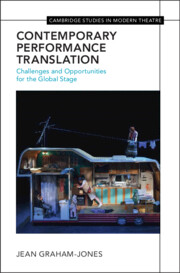Book contents
- Contemporary Performance Translation
- Cambridge Studies in Modern Theatre
- Contemporary Performance Translation
- Copyright page
- Contents
- Figures
- Acknowledgments
- Introduction
- 1 Translationality in Performance
- 2 The Over-translated, the Under-translated, the Untranslatable, and the Limits of Performance Translation
- 3 Translationality and the Atypical Actor in Performance
- 4 Translationality and the Decolonial Gesture in Performance
- Conclusion
- References
- Index
1 - Translationality in Performance
Published online by Cambridge University Press: 19 December 2024
- Contemporary Performance Translation
- Cambridge Studies in Modern Theatre
- Contemporary Performance Translation
- Copyright page
- Contents
- Figures
- Acknowledgments
- Introduction
- 1 Translationality in Performance
- 2 The Over-translated, the Under-translated, the Untranslatable, and the Limits of Performance Translation
- 3 Translationality and the Atypical Actor in Performance
- 4 Translationality and the Decolonial Gesture in Performance
- Conclusion
- References
- Index
Summary
Chapter 1 develops the book’s theoretical frame as well as provides initial experiential examples. In the author’s practice, theatrical translationality has inspired reconsiderations of actor-training practices, rehearsal processes, and artist-audience expectations, and it has modified her approaches to translation and direction. To illustrate, the chapter first turns to the author’s decades-long working relationship with Argentinian dramatist Ricardo Monti and the collaborative process in translating and publishing ten of his lyrical and imagery-rich texts into English, and her experience in directing the English-language translation of his play Visit with US actors. The chapter then shifts to a scholarly perspective to apply a theory of translationality to the radical revisionary processes at work in Argentinian playwright-director Daniel Veronese’s “Chekhov Project,” a multi-production endeavor that involved not only his versions of Three Sisters and Uncle Vanya but also an original play, Mujeres soñaron caballos (Women Dreamt Horses). The chapter concludes with the author’s reflections on translating Veronese’s original play for a New York theatre festival, interpreting its success as largely the result of a translational collaboration between text, author, translator, director, cast, and producer. A theory of translationality accommodates and encourages these interlinked theatrical and performance elements, experiences, and participants.
- Type
- Chapter
- Information
- Contemporary Performance TranslationChallenges and Opportunities for the Global Stage, pp. 16 - 44Publisher: Cambridge University PressPrint publication year: 2024

